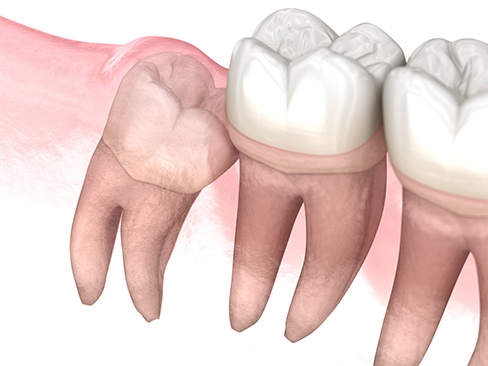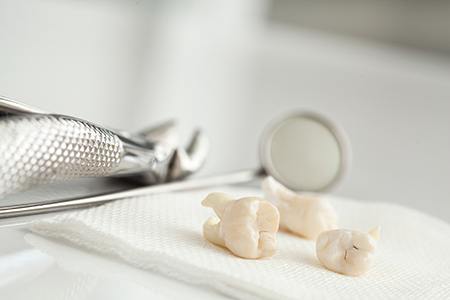
Wisdom Tooth Extractions Dallas
Protecting Your Smile from Complications
Arts Family Dentistry of Dallas welcomes patients of all ages to take advantage of our services, and naturally, that includes any young adults who are around the age when their wisdom teeth are expected to come in. To avoid problems with these teeth and protect your smile from complications, we can perform extractions so that troublesome wisdom teeth never have a chance to cause lasting damage. Give us a call to learn more about our approach to wisdom tooth extractions in Dallas, TX.

Why Choose Arts Family Dentistry of Dallas for Wisdom Tooth Extractions?
- Same-Day Emergency Appointments
- Dental Sedation for Stress-Free Visits
- Gentle Team Who Listens to You
What Are Wisdom Teeth?

Wisdom teeth are the third set of molars, which develop at the back of the mouth when an individual is in their teens or early adulthood. Most people get four wisdom teeth, one in each quadrant of the mouth, though some individuals get more or fewer.
Why Do Wisdom Teeth Need to Be Removed?

It is sometimes possible to keep wisdom teeth if they are able to erupt fully and do not cause any damage to the rest of the smile. That said, an extraction may be the only option if wisdom teeth become fully or partially impacted, which can cause pain, crowded teeth, and dental infections. We can evaluate your wisdom teeth and check to see if they are likely to cause any problems in your mouth when left alone; if they are, we will take steps to have them removed as soon as possible.
What to Expect from the Wisdom Teeth Procedure

Before extracting wisdom teeth, we numb the mouth. We may also administer sedation. Once you are comfortable, we may use an elevator to lift each tooth out of its socket, grasp it with forceps, and then gently break the connective tissues holding it in place.
If the wisdom teeth are impacted (stuck beneath the gumline), removing them may require a more complex procedure. It might even be necessary to create incisions in your gums or break the teeth into pieces.
Recovering From Wisdom Teeth Extraction

Most people are back to feeling normal within 1 – 2 weeks after their procedure. In the meantime, you may experience swelling, discomfort, and intermittent bleeding. You can reduce your discomfort and lower your risk of complications by taking some simple steps:
- Maintain good oral hygiene, but be very careful around your extraction sites.
- Do not touch the extraction sites with your tongue, fingers, or toothbrush.
- Avoid hard, crunchy, and chewy foods.
- Take any medications as directed by our team.
- Get enough rest.
- Do not smoke or drink through a straw.
- Call us if you have questions or concerns during your recovery period.
Understanding the Cost of Wisdom Tooth Extractions

Before you commit to having a wisdom tooth extraction performed, you should make sure that you understand how much the procedure will cost. We’ll provide you with an accurate estimate during your initial consultation. On top of that, we can help you review your payment options and work with you to figure out the best way to fit your wisdom tooth extraction into your budget.
Factors That Can Impact the Cost of Wisdom Tooth Extractions

Not all wisdom tooth extractions are exactly the same. For example, while most people have all four of their wisdom teeth taken out at once, others may not even have four wisdom teeth to begin with. The number of teeth being extracted will affect the amount that you can expect to pay for the procedure.
There’s also the complexity of the extraction to consider. Impacted wisdom teeth tend to be more difficult to remove than those that have managed to fully erupt from beneath the gums. Thus, you can usually expect a higher cost for an extraction that involves an impacted wisdom tooth.
Finally, you may be planning to have sedation dentistry administered during your wisdom tooth extraction. This can go a long way toward helping you stay calm and comfortable in the dental chair. However, it’s important to remember that sedation dentistry will add to the overall cost of your treatment.
Does Dental Insurance Cover Wisdom Tooth Extractions?

Oftentimes, you can indeed expect your dental insurance to help pay for a wisdom tooth extraction. Coverage can vary depending on the plan as well as the specifics of the procedure, but it can potentially fall anywhere in the range of 50% to 80%. Bear in mind that factors such as your deductible or your plan’s annual maximum can affect the amount that needs to be paid out of your own pocket.
Our team is ready to work with you in order to ensure that you get the most out of your benefits. Not only can we file any necessary claims on your behalf, but we’re more than happy to answer any insurance-related questions that might be on your mind. Additionally, we’re in-network with a number of popular dental insurance providers, including Delta Dental, Aetna, Humana, MetLife, and Guardian.
How to Make Wisdom Tooth Extractions Affordable

Not everyone has dental insurance, but fortunately, our practice has another option for making wisdom tooth extractions more budget-friendly: financing. Our team can help you apply for a payment plan from CareCredit or Sunbit, allowing you to pay for your care in monthly installments. This approach can take much of the stress out of the financial aspect of your treatment. On top of that, CareCredit financing plans typically come with low or no interest.
Interested in financing for your upcoming treatment? Don’t hesitate to speak to our team to learn more about this option.
Wisdom Tooth Extractions FAQs
Why Do We Have Wisdom Teeth?
It seems like wisdom teeth cause nothing but issues. However, they benefited our early human ancestors. Early humans subsisted on a diet of raw foods, like meat, betties, nuts, roots, and leaves. They didn’t cut up their food or even cook it. Chewing these foods required a broader jaw with strong molars. Back then, their large jaws easily accommodated the wisdom teeth, so they rarely caused problems. Today, we eat softer foods that are cooked, baked, cut, or otherwise prepared. This makes the wisdom teeth no longer necessary for most people/ On top of that, our jaws aren’t as wide as they used to be, so the wisdom teeth can cause issues when erupting. Ultimately, it is best for many patients to have these molars extracted so they don’t lead to complications.
Does Everyone Have Wisdom Teeth?
Most people have four wisdom teeth that erupt in late adolescence or early adulthood. However, some people are missing wisdom teeth and others aren’t born with any at all. In a 2015 article published by the Dental Research Journal, it is estimated that anywhere from 5% to 37% of people are missing one or more of their wisdom teeth. It is unknown why some people don’t develop all of their third molars, but genetics likely play a role. If one of your parents is missing wisdom teeth, this may apply to you as well. A dental C-ray is the best way to tell how many wisdom teeth you have.
Is Wisdom Teeth Removal Painful?
The first step when removing wisdom teeth is to numb the mouth with a local anesthetic. You will also most likely be sedated, lowering your body’s ability to register pain. You can expect the procedure to be completely painless. However, you will likely experience some soreness for several days after you recover. By closely following your dentist’s aftercare guidelines, you should feel back to yourself within a few weeks.
How Long Does Wisdom Tooth Removal Take?
On average, it takes about 15 to 20 minutes to extract each tooth. Removing all four can take up to 90 minutes. The time that it takes varies on the tooth’s location, position, and whether it’s impacted. During your consultation, we can give you a more specific estimate so you can plan accordingly.



